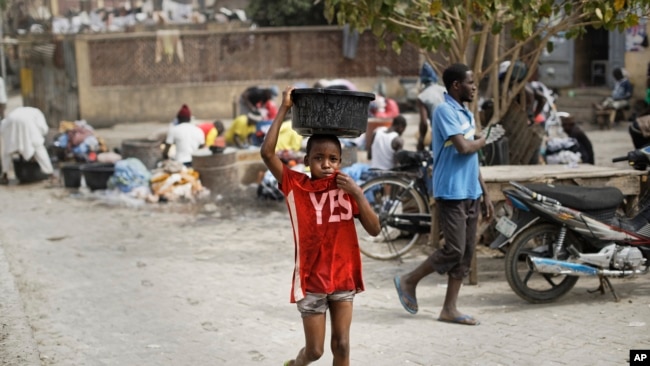

ABUJA, NIGERIA — On the commemoration of World Water Day, UNICEF is raising concerns about Nigeria, where an estimated 70% of water at the point of consumption is contaminated.
The U.N. agency said the contamination is why Nigeria has the world’s highest number of deaths from waterborne disease among children under five years old.
Closely built temporary shelters are the norm at sites for internally displaced people, such as the Kuchigoro camp of Abuja.
Camp officials say up to 3,000 IDPs live in Kuchigoro after fleeing Boko Haram attacks in their homes. But access to water is a daily struggle, says Bitrus Yusuf, an official at the camp.
“Our women usually go to nearby estates looking for water, begging for water,” Yusuf said. “We are highly in need of water for our daily use. As you can see the camp is compacted.”
Yusuf says the congested tents and the lack of access to water and proper hygiene make the camp prone to diseases.
He says cholera outbreaks have been recurring, and other diseases like dysentery or diarrhea are also common.
Last August, about 40 cases of cholera were reported, and camp officials said at least 10 people died, including Istifanus Bitrus’ four-year-old son.
“It affected two of my children, but one eventually died on our way to the hospital,” Bitrus said. “The other one was treated at the hospital, people helped me with money, and he got better.”

Camp officials said the cholera outbreak was later found to be caused by sewage leaking into the camp’s only water source.
UNICEF said 70% of water at the point of consumption is contaminated and that children are the most affected.
As a result, UNICEF says 117,000 children die in Nigeria each year due to water-related illnesses – the highest number of any nation.
Jane Bevan is UNICEF’s chief of water, sanitation and hygiene program, or WASH.
“If there’s no constraint on open defecation, for example people are defecating in water courses and on the surface, this contamination will percolate into the ground water inevitably,” Bevan said. “So, the only answer is really to treat water safely before it’s consumed and ideally to reduce open defecation as much as possible.”
Nigerian authorities have been trying to improve access to water but experts said authorities must also make improvements in water hygiene.
The U.N.’s first-ever assessment of water security in Africa, released Monday, shows up to half a billion people are living in areas designated as water insecure, including Nigeria.